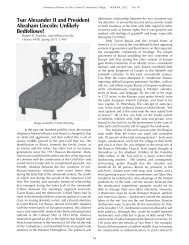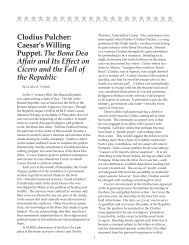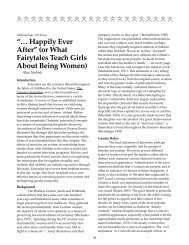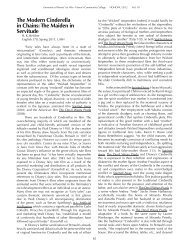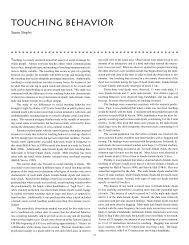A JOURNAL OF ACADEMIC WRITING VOLUME 8
A JOURNAL OF ACADEMIC WRITING VOLUME 8
A JOURNAL OF ACADEMIC WRITING VOLUME 8
Create successful ePaper yourself
Turn your PDF publications into a flip-book with our unique Google optimized e-Paper software.
d d d d d d d d d d d d d d d d d d d d d d<br />
Effects of Advertising on<br />
Society: A Literary Review<br />
Goldie Hayko<br />
English 215<br />
The first evidence of advertising was found among the<br />
ancient Babylonian Empire and dates back to the 3000s BC.<br />
The first advertisement in English went into print in 1472, in<br />
order to sell a prayer book. The profession of advertising began<br />
in the United States in 1841, and although it has been modified<br />
a great deal, is still around today (Robbs 12). There is no<br />
argument that the media has become a very present force in the<br />
American lifestyle, and with any form of “free” media will come<br />
an abundance of advertisements.<br />
Since the late 1800’s, psychologists and scholars alike have<br />
been studying the ways in which advertisements can affect a<br />
person mentally and emotionally. The effects that advertising<br />
has on society have been a long and heated debate, with a<br />
wide array of opinions on the issue. Opinions range from<br />
the advertising executive, who believes that their company<br />
is doing society a favor by providing them with valuable<br />
information, to the market researcher, who admits to their<br />
sneaky practices. Members of society, ranging from the parent<br />
to the psychologist, all have their reasons to back up why they<br />
believe that the prominence of advertising affects some sector of<br />
society (be it children, a woman’s image, or a consumer society)<br />
in some way, negatively or positively. Whether advertising is<br />
good or bad for society, unless someone is a hermit and does<br />
not watch TV, movies, read newspapers, magazines, or journals,<br />
listen to the radio, or surf the web, they will be affected<br />
by advertisements. Some psychologists believe that we are<br />
“subliminally stimulated” which causes us to think in a way that<br />
is almost controlled by the media. Regulatory agencies such<br />
as the Federal Trade Commission have said that advertising<br />
companies prey on childrens’ vulnerability in order to make an<br />
easy buck. However, some experts who analyze the marketing<br />
business oppose this view. They believe that market researchers<br />
are merely taking a stab in the dark at trying to figure out how<br />
to best sell their products. There are two major polarities on this<br />
issue; one side believes that advertising is harmful to society, the<br />
other side believes that advertising does not affect society in a<br />
negative way.<br />
Whether we are experts on the matter or have no<br />
knowledge of it what-so-ever, it is important to really think<br />
about the role that advertising plays in our own lives, no matter<br />
whether it is negative or positive. Does advertising really affect<br />
us on some level, a level that influences our thinking patterns<br />
and even our actions? Or is it merely a communication channel<br />
between seller and consumer?<br />
Despite the fact that advertising has operated successfully<br />
for many years, the prevailing stance within academic circles is<br />
that advertising is harmful to society. Insiders in the ad business<br />
even admit to the evils that come with advertising. Jay Chait,<br />
an advertising guru who revolutionized the industry in the<br />
sixties, gives his insider’s point of view in his article Illusions Are<br />
Forever. Since the advertising industry is now heavily regulated<br />
by the FTC and other agencies, they can not lie in their ads.<br />
However, there is a lie in the “art of advertising” (Chait 1). The<br />
methods in which situations are presented to the public through<br />
advertisements are not realistic. Companies want us to believe<br />
that we should live the life that they present to us on screen,<br />
with their products. Because we deal with advertisements on a<br />
daily basis and have become so accustomed to their messages,<br />
we often “have trouble seeing things in our own natural way”<br />
(1). Advertising substitutes our most intimate thoughts with<br />
their own ideas of what should be (Chait 1). Although the<br />
media can expose us to information that we might otherwise<br />
not receive, we pay a price for that information. In any<br />
industrialized society “there is little personal knowledge of<br />
anything in the world that is not filtered by media” (1).<br />
Richard Pollay, author of The Distorted Mirror: Reflection on<br />
the Unintended Consequences of Advertising, uses the metaphor of<br />
“brain surgery” when he speaks of the influence that advertising<br />
has on society. Advertising pops up everywhere, on the street, in<br />
our communication, and even in the most intimate of spaces,<br />
our home. There is no doubt that advertising influences our<br />
culture, which in turn influences us (Pollay 18). Avertisements<br />
are designed to “attract attention, change attitudes, and to<br />
command our behavior” (Pollay 18). Advertisements present<br />
us with a set of images that idealize certain life circumstances.<br />
They present this information in a way that is easily absorbed<br />
so that we do not have to do a lot of thinking in order to take<br />
in the concept and apply it at a later time subconsciously. Of<br />
course, not all advertisements will be able to pull this off, but<br />
the majority of them “must-otherwise, advertisers are financially<br />
extravagant fools” (Pollay 18). Modern big time advertisers have<br />
at their fingertips an information pool of “applied behavioral<br />
technologies for consumer behavior and advertising research”<br />
(Pollay 18). This allows the company to perfectly tailor the ad<br />
HOHONU Volume 8 2010 - 79



